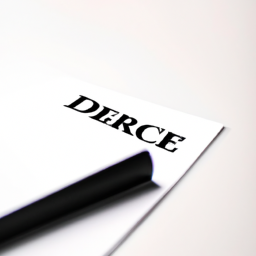Are you feeling overwhelmed and desperate as you face the possibility of divorce? It’s possible to stop your divorce and rebuild your relationship. The decision to end a marriage is never easy, and it often comes with a whirlwind of emotions, uncertainty, and fear. But amidst the chaos, there is hope. By taking the time to understand the underlying issues and working together with your partner, you can find a way to save your marriage. In this blog post, we will explore various strategies and techniques that can help you navigate this challenging time and potentially prevent the dissolution of your union. So, take a deep breath, gather your strength, and let’s embark on this journey to save your marriage.
Understanding the Reasons Behind Divorce and How to Address Them
Divorce is a complex and emotionally challenging process that affects many individuals and families. It is crucial to understand the reasons behind divorce in order to effectively address them and work towards stopping it. By taking a step back and analyzing the situation from an empathic perspective, we can gain valuable insights into the underlying causes and find ways to resolve them. This article aims to provide you with a step-by-step guide on how to address the reasons behind divorce and potentially save your marriage.
1. Communication Breakdown: Rebuilding the Foundation
One of the most common reasons for divorce is a breakdown in communication between spouses. When communication becomes ineffective or non-existent, it creates a gap between partners, leading to misunderstandings, resentment, and ultimately, the breakdown of the relationship. To address this issue, it is essential to rebuild the foundation of communication.
Start by creating a safe and non-judgmental space for open and honest dialogue. Both partners should actively listen to each other, expressing their thoughts and feelings without interruption. Avoid blame and criticism, focusing instead on understanding each other’s perspectives. Practice empathy and validation, acknowledging and validating your partner’s emotions. Through effective communication, you can bridge the gap and rebuild trust, strengthening the foundation of your relationship.
Additionally, consider seeking professional help through couples therapy or marriage counseling. A trained therapist can guide you through communication techniques, help you identify underlying issues, and provide tools to improve your interactions. Remember, rebuilding communication takes time and effort, but it is a crucial step towards stopping your divorce.
2. Unresolved Conflict: Finding Common Ground
Unresolved conflict can significantly contribute to the breakdown of a marriage. When conflicts arise, they often stem from differences in values, expectations, or unmet needs. To address this reason behind divorce, it is essential to find common ground and work towards resolving conflicts in a healthy and constructive manner.
Start by identifying the underlying issues causing the conflict. Take time to reflect on your own needs and emotions, and encourage your partner to do the same. Once you have a better understanding of the root causes, engage in open and respectful discussions to find mutually beneficial solutions. Compromise and negotiation are key in finding common ground.
It is crucial to approach conflict with empathy and understanding. Avoid becoming defensive or attacking your partner’s character. Instead, focus on the specific issue at hand and brainstorm potential solutions together. Remember, the goal is not to win the argument, but to find a resolution that satisfies both partners and strengthens the relationship.
If you find it challenging to navigate conflicts on your own, consider seeking guidance from a professional mediator or therapist. They can provide an unbiased perspective, facilitate productive conversations, and help you develop effective conflict resolution skills. With patience, understanding, and a willingness to find common ground, you can address unresolved conflicts and prevent your divorce.
3. Lack of Intimacy: Rediscovering Connection
A lack of intimacy is another common reason why marriages end in divorce. Intimacy encompasses emotional, physical, and sexual connection, all of which are vital for a healthy and fulfilling relationship. To address this issue, it is crucial to rediscover and nurture the connection between you and your partner.
Start by prioritizing quality time together. Make an effort to engage in activities that you both enjoy and that promote bonding. This could include going on dates, taking walks, or simply spending uninterrupted time talking and reconnecting. Show genuine interest in your partner’s life and actively listen to their thoughts and feelings.
Physical affection is also essential for rebuilding intimacy. Small gestures like holding hands, hugging, or kissing can go a long way in reigniting the spark. Be open and honest about your desires and needs, creating a safe space for discussing your sexual relationship. Seek ways to enhance intimacy and explore new experiences together.
However, it is important to note that addressing a lack of intimacy may require professional help. A therapist or sex counselor can guide you through exercises, communication techniques, and provide guidance on improving your intimate relationship. Remember, rebuilding intimacy takes effort from both partners, but it is a vital step towards stopping your divorce and creating a stronger bond.
In conclusion, understanding the reasons behind divorce and addressing them is essential for stopping the process and potentially saving your marriage. By focusing on rebuilding communication, finding common ground in unresolved conflicts, and rediscovering intimacy, you can work towards strengthening your relationship. Remember, it takes time, effort, and a commitment from both partners to stop a divorce and build a healthier, happier future together.

Effective Communication Strategies to Save Your Marriage
Marriage is a beautiful union that requires constant effort and effective communication to thrive. When faced with the possibility of divorce, it’s crucial to take proactive steps to save your marriage. By improving your communication skills, you can create a stronger emotional connection with your partner and work towards resolving conflicts. In this article, we will explore some effective communication strategies that can help you save your marriage.
1. Active Listening: The Key to Understanding
One of the most crucial aspects of effective communication is active listening. When your partner is speaking, give them your undivided attention. Avoid interrupting or formulating responses in your mind while they are talking. Instead, focus on truly understanding their perspective.
Practice empathy by putting yourself in their shoes and trying to see things from their point of view. This will help you build a deeper connection and foster understanding between both of you. Reflect on what they’ve said before responding, ensuring that you’ve understood their message accurately.
Additionally, non-verbal cues play a significant role in communication. Maintain eye contact, nod, and provide verbal affirmations to show that you are actively listening. These small gestures can make your partner feel heard and valued.
2. Express Your Feelings and Needs
It’s essential to express your feelings and needs openly and honestly in a marriage. Bottling up emotions can lead to resentment and misunderstandings. Be vulnerable with your partner and share how you feel about certain situations or issues that are affecting your relationship.
When expressing your feelings, use “I” statements instead of “you” statements to avoid sounding accusatory. For example, say “I feel hurt when…” instead of “You always make me feel hurt when…”. This approach allows you to take ownership of your emotions and encourages your partner to listen without becoming defensive.
Furthermore, clearly communicate your needs to your partner. Be specific about what you require from them to feel loved, supported, and understood. Remember, your partner is not a mind reader, so expressing your needs is essential for building a strong foundation of understanding and compromise.
3. Practice Effective Conflict Resolution
Conflicts are inevitable in any relationship, and how you handle them can make or break your marriage. To save your marriage, it’s crucial to practice effective conflict resolution techniques.
Firstly, approach conflicts with a calm and composed mindset. Avoid escalating arguments by taking breaks if needed. Use “I” statements to express your concerns and avoid attacking your partner’s character. Remember, the goal is to find a solution together, not to win an argument.
Active listening plays a significant role during conflicts as well. Truly hear your partner’s perspective and validate their feelings, even if you disagree. This will create an environment of mutual respect and understanding.
Seek compromises that address both of your needs. Remember that finding a middle ground requires flexibility and a willingness to understand each other’s perspectives. By working together to find solutions, you can strengthen your bond and resolve conflicts more effectively.
Effective communication is the cornerstone of a successful marriage. By practicing active listening, expressing your feelings and needs, and implementing effective conflict resolution techniques, you can save your marriage from the brink of divorce. Remember, it takes time and effort from both partners to rebuild trust and create a healthier, more fulfilling relationship. Stay committed and open to growth, and you’ll be on your way to a happier, long-lasting marriage.

Seeking Professional Help: Marriage Counseling and Therapy for Divorce Prevention
Marriage is a beautiful union between two individuals who commit to sharing their lives together. However, sometimes even the strongest bonds can be strained, and couples find themselves contemplating divorce. If you are currently facing this difficult situation, it’s essential to remember that it is possible to stop your divorce. Seeking professional help through marriage counseling and therapy can be a game-changer in saving your marriage and rebuilding a stronger foundation. Let’s explore how these interventions can help you navigate the challenging path towards divorce prevention.
Understanding the Importance of Marriage Counseling
Marriage counseling provides a safe and supportive environment for couples to address their concerns, improve communication, and work towards resolving conflicts. It involves meeting with a licensed therapist who specializes in couples therapy. The primary goal of marriage counseling is to identify the root causes of marital distress and develop effective strategies to overcome them.
One of the most significant advantages of marriage counseling is the impartial perspective provided by the therapist. They act as a mediator, ensuring that both partners have an equal opportunity to express their feelings and concerns. This unbiased approach helps create a conducive atmosphere where open and honest communication can flourish.
During marriage counseling sessions, couples learn valuable skills to enhance their relationship. These skills include active listening, conflict resolution, and effective problem-solving techniques. By acquiring these tools, couples can navigate difficult situations more effectively and develop a deeper understanding of each other’s needs and desires.
The Benefits of Marriage Counseling and Therapy
1. Improved Communication: Effective communication is the foundation of a healthy marriage. Marriage counseling provides a platform for couples to express their thoughts and emotions openly. Therapists help identify communication patterns that may be hindering effective dialogue and guide couples towards more productive interactions. By improving communication, couples can rebuild trust and strengthen their emotional connection.
2. Conflict Resolution: Every marriage encounters conflicts, but it’s how couples handle these conflicts that can make or break a relationship. Marriage counseling equips couples with conflict resolution skills, teaching them how to address differences constructively. Therapists help couples identify unhealthy patterns, such as avoidance or aggression, and guide them towards healthier alternatives. By learning how to resolve conflicts in a respectful and compassionate manner, couples can prevent minor disagreements from escalating into major issues.
3. Emotional Support: Divorce can be an emotionally draining experience for both partners. Marriage counseling provides a supportive environment where couples can express their feelings and fears without judgment. Therapists offer guidance and emotional support, helping couples navigate the complexities of their emotions during this challenging time. By feeling understood and supported, couples can develop a renewed sense of hope and determination to save their marriage.
Choosing the Right Therapist
When seeking professional help for your marriage, it’s crucial to choose the right therapist who aligns with your needs and values. Here are a few factors to consider when selecting a marriage counselor:
1. Experience and Expertise: Look for a therapist who specializes in couples therapy and has experience working with couples facing divorce. They should have a solid understanding of the dynamics and challenges associated with marital distress.
2. Compatibility: It’s essential to feel comfortable and connected with your therapist. A good therapeutic relationship is built on trust and mutual respect. Take the time to find a therapist who makes you feel heard and understood.
3. Approach and Techniques: Different therapists may employ various therapeutic approaches and techniques. Research and inquire about their preferred methods to ensure they align with your goals and preferences.
4. Accessibility: Consider practical factors such as location, availability, and cost. It’s important to find a therapist who is accessible and fits within your schedule and budget.
Remember, finding the right therapist may take time and effort, but it is crucial for the success of your marriage counseling journey.
Seeking professional help through marriage counseling and therapy can be a transformative experience for couples on the brink of divorce. It provides a structured and supportive environment where couples can work through their challenges, improve communication, and rebuild their relationship. By investing time and effort into this process, you can increase the chances of stopping your divorce and creating a happier, healthier, and more fulfilling marriage.
I’ll leave you with these final thoughts
Going through a divorce is undoubtedly one of the most challenging experiences a person can face. It’s a time filled with confusion, heartache, and uncertainty about the future. However, amidst all the turmoil, it’s crucial to remember that it is possible to stop your divorce and rebuild your relationship. It’s understandable that you may feel overwhelmed and hopeless right now, but there is always hope for reconciliation.
When facing a divorce, it’s essential to acknowledge the pain and emotions that both you and your partner are experiencing. Take a moment to reflect on the reasons that led to this point and understand the underlying issues that need to be addressed. Communication is key during this time, and it’s crucial to have open and honest conversations with your spouse. Express your feelings, listen to their perspective, and try to find common ground. Remember, empathy and understanding can go a long way in resolving conflicts and healing a broken relationship.
Additionally, seeking professional help, such as couples therapy or marriage counseling, can provide a safe space for both partners to express their concerns and work towards a resolution. A skilled therapist can guide you through the process, helping you identify and address the root causes of your problems. With their guidance, you can learn effective communication techniques, develop healthy coping mechanisms, and rebuild trust. Remember, it’s important to be patient and committed to the process, as healing takes time.
Stopping a divorce is not an easy task, but it’s not impossible either. By acknowledging your emotions, communicating openly, and seeking professional help, you can take significant steps towards saving your marriage. Remember, it’s essential to approach this journey with empathy and understanding, both towards yourself and your partner. Ultimately, with dedication and a willingness to work on your relationship, there is hope for a brighter future together.
Frequently Asked Questions from our readers:
Q1: Is it really possible to stop a divorce?
A1: Absolutely! It is indeed possible to stop a divorce, even if it may seem difficult or overwhelming at times. Many couples have successfully saved their marriages by taking proactive steps and seeking professional guidance. With commitment, open communication, and a willingness to work on the relationship, you can increase the chances of stopping your divorce and rebuilding a strong and loving partnership.
Q2: What are some common reasons why couples consider divorce?
A2: Every relationship is unique, and the reasons for considering divorce can vary greatly. Some common reasons include communication breakdown, unresolved conflicts, infidelity, lack of intimacy, financial issues, substance abuse, and growing apart. It’s important to remember that these challenges can be addressed and overcome with the right approach and support.
Q3: How can I stop my divorce and save my marriage?
A3: Saving a marriage requires effort and commitment from both partners. Here are some steps you can take to stop your divorce:
- Open and honest communication: Express your feelings, concerns, and desires to your spouse, and actively listen to their perspective.
- Seek professional help: Consider couples therapy or marriage counseling to gain insights, learn effective communication strategies, and work through underlying issues.
- Focus on self-improvement: Take time to reflect on your own behavior and make positive changes. This can inspire your spouse to do the same.
- Rebuild trust and intimacy: Make an effort to rebuild trust through honesty, transparency, and consistent actions. Prioritize quality time together and work on reigniting the emotional and physical connection.
- Be patient and persistent: Saving a marriage takes time and effort. Stay committed to the process, even when it feels challenging, and remember that positive changes won’t happen overnight.
Q4: Can professional help really make a difference in stopping a divorce?
A4: Yes, seeking professional help can make a significant difference in stopping a divorce. Marriage counselors and therapists are trained to provide guidance, support, and effective strategies to help couples navigate their challenges. They can help you and your spouse gain new perspectives, improve communication, resolve conflicts, and work towards rebuilding a strong and fulfilling marriage.
Q5: What if my spouse is not willing to work on saving our marriage?
A5: It can be disheartening if your spouse is not initially willing to work on saving the marriage. However, don’t lose hope. Focus on your own personal growth and self-improvement, as positive changes in yourself can inspire change in your partner. Consider seeking individual therapy to gain insights and support. Additionally, give your spouse some space and time to reflect on their own feelings. Sometimes, when they see your commitment and positive changes, they may become more open to working on the marriage.



